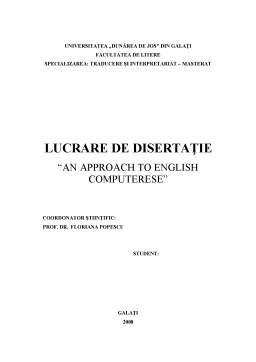Cuprins
- INTRODUCTION 1
- CHAPTER I
- ENGLISH THROUGH THE AGES 4
- 1.1. EARLY BEGINNINGS 4
- 1.2. THE ENGLISH LANGUAGE IN MIDDLE AGES 13
- 1.3. THE ENGLISH LANGUAGE TODAY 19
- CHAPTER II
- LINGUISTIC APPROACHES TO THE ENGLISH LANGUAGE 30
- 2.1. REGIONAL VARIATION 31
- 2.2. SOCIAL VARIATION 32
- 2.3. VARIETIES ACCORDING TO FIELD OF DISCOURSE 39
- 2.4. VARIETIES ACCORDING TO MEDIUM 41
- 2.5. VARIETIES ACCORDING TO ATTITUDE 42
- 2.6. VARIETIES ACCORDING TO INTERFERENCE 45
- 2.7. RELATIONSHIPS AMONG VARIETY TYPES 47
- CHAPTER III
- REGISTERS OF THE ENGLISH LANGUAGE 51
- CHAPTER IV
- COMPUTERESE 59
- CONCLUSIONS 67
- BIBLIOGRAPHY 69
- APPENDIX 72
- 1. BASIC COMPUTER TERMINOLOGY 72
- 2. BASIC INTERNET TERMINOLOGY 80
Extras din proiect
INTRODUCTION
English is generally acknowledged to be the world’s most important language. It is perhaps worth glancing briefly at the basis of its evolution for that evaluation. There are thousands of different languages in the world, and each will seem uniquely important to those who speak it as their native language, the language they acquired at their mother’s knee. But there are more objective standards of relative importance.
One criterion is the number of speakers of the respective language. A second is the extent to which a language is geographically dispersed: in how many continents it is used or is knowledge of it necessary- A third is its functional load: how extensive is the range of purposes manifestations such as a science or a literature- A fourth is the economic and political influence of the native speakers of the language.
If we restrict the first criterion to native speakers of the language, the number of speakers of English is more than 300 million, and English ranks well below Chinese (which has over three times that number of speakers). The second criterion, the geographical dispersal of the language, invites comparison with (for example) Hebrew, Latin, and Arabic as languages used in major world religions, though only Arabic has a substantial number of speakers. But the spread of English over most of the world as an international language is a unique phenomenon in the world’s history: about 1500 million people – over a third of the world’s population – live in countries where English has some official status or is one of the native languages, if not the dominant native language. By the third criterion, the great literatures of the Orient spring to mind, not to mention the languages of Tolstoy, Goethe, Cervantes and Racine. But in addition to bring the language of the still more distinguished Shakespeare, English leads as the primary medium for twentieth century science and technology. The fourth criterion invokes Japanese, Russian and German, for example, as languages of powerful, productive, and influential nations. But English is the language of the United States, whose gross domestic product in 1980 was more than double that of its nearest competitor, Japan. (R. Quirk, 1997:3)
No claim has been made for the importance of English on the grounds of its quality as a language (the size of its vocabulary, its relative lack of inflections, the alleged flexibility of its syntax). The choice of an international language, or lingua franca, is never based on linguistic or aesthetic criteria but always on political, economic, and demographic ones. (R. Quirk, 1997:3)
It is necessary to study the history of English in order to understand certain lexical, phonetic and grammatical phenomena of the contemporary language.
A study of the history of the English language will also help us to go deeper into the general principles of linguistics, such as the interdependence of linguistic phenomena, the gradual, uninterrupted evolution of language, its passing from insignificant and scarcely perceptible quantitative changes to obvious, fundamental qualitative changes, etc.
Written documents constitute the main material and the most important means to be resorted to for studying the language of ancient times. They give us a clear idea of the vocabulary, of the morphology and the syntax of the respective period. They are not of great help as concerns the pronunciation, because one and the same letter may represent different sounds and, on the other hand, spelling is rather conservative and does not always reflect phonetic changes. The orthography of old documents often corresponds to the pronunciation of an anterior period. Letters and diaries written by less educated people, who have a tendency to writhe phonetically, sometimes give us clearer idea about pronunciation than the literature and the works of specialists of the respective time do. (E. Iarovici, 1973:5) The latter were often concerned with how words ought to be pronounced rather than with how they were actually pronounced.
The study of English language has been a main concern of linguists. The history of English language has been analyzed by many authors which: Hogg (2006), Farrar (2005), Gramley (1992). All works present the origins of the English language and the different varieties existing in English language: Knowels (1998), Iarovici (1973).
The registers of English language were analyzed by Agna (2001), Croitoru (1999), Herbert (1965).
The work consists of four chapters. The first chapter, English through the Ages, presents the history of English language taking also into consideration the events in history that changed the language. The second chapter, Linguistic Approaches to the English Language, deals with different varieties of any language can be described, interrelated, and studied is one of the prime concerns of the branch of language study called sociolinguistics. This subject is far from having achieved complete answers, and all attempts are, in some degree, over simplifications.
A speaker of English has a repertoire of varieties according to field and switches to the appropriate one as occasion requires. The number of varieties that speakers command depends upon their profession, training and interests.
Preview document
Conținut arhivă zip
- An Approach to English Computerese
- 1_PRIMA PAGINA.doc
- 2_CONTENTS.doc
- DISERTATIE.doc





































































































